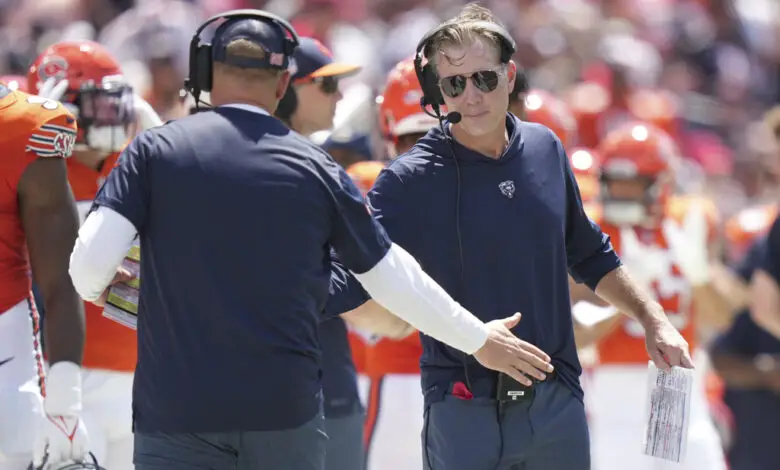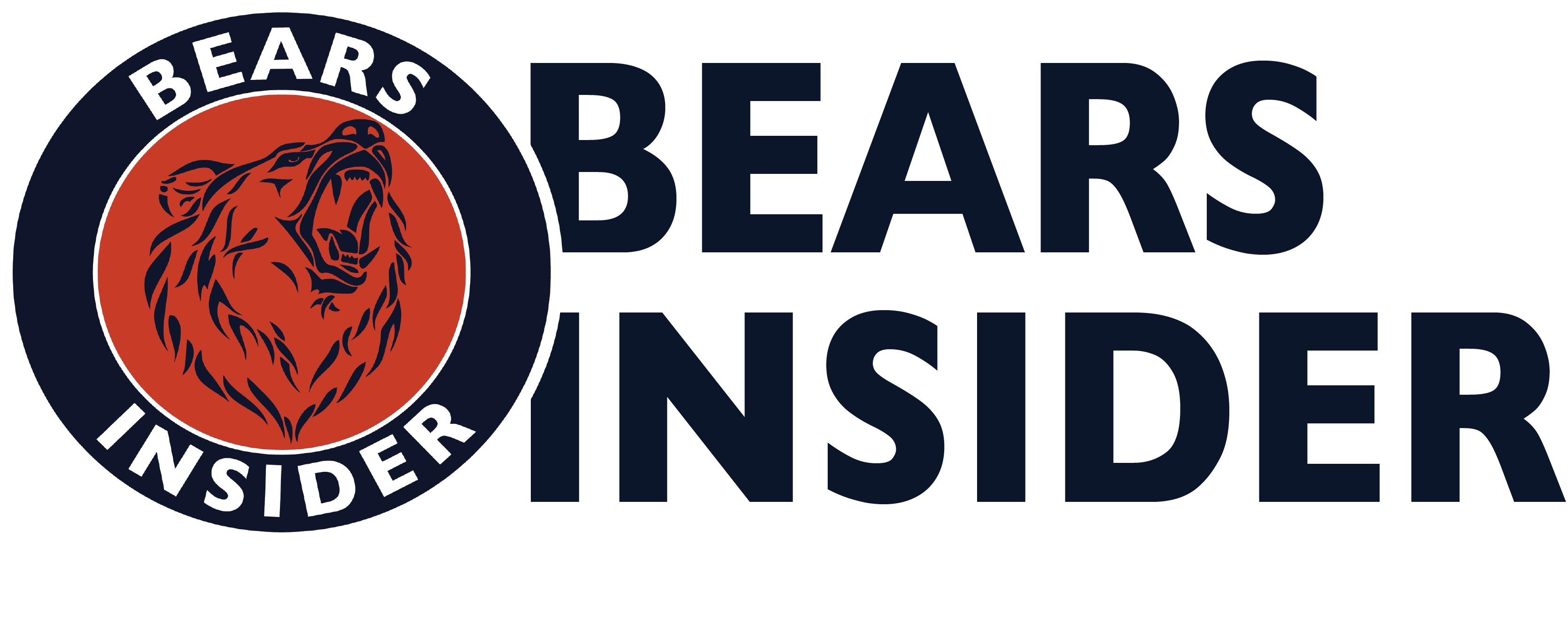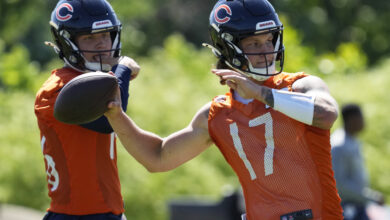
Chicago Bears Way-Too-Early Post-Mortem: Who Stays? Who Goes?
Sunday’s loss to the Browns (Collapse in Cleveland, Mistake by the Lake, Pounding in the Dawg Pound, etc.) virtually eliminated the small chance the Bears had to make the playoffs. Chicago entered the game sitting in last place in the NFC North with a 5-8 record and a five percent chance of getting a Wild Card entry into this year’s Super Bowl tournament. Not anymore. The Bears blew a fourth-quarter double-digit lead for the third time this year and have about a 2.7% shot at making the postseason, so now it’s time to focus on the future.
A passionate fanbase has already made their minds up about Justin Fields, Matt Eberflus, and Luke Getsy, but let’s examine each and a few others from a more rational standpoint. The Bears are an improving team and that matters more than anything. The final three games may provide a measure for some, but we’ve got a large enough sample size to make educated projections.
Kevin Warren
Warren inherited this complete mess, and the McCaskeys love him. He’s going to be with the Bears until he retires. Warren is also believed to be pro-Eberflus, but that’s a fluid situation, especially after Sunday’s loss.
Ryan Poles
Montez Sweat is better as a Bear than Commander.
Brisker is better than Pickens.
Darnell Wright is as good as Jalen Carter.
Kyler Gordon. DJ Moore. Braxton Jones.Lots of scouting wins for Ryan Poles. Big decisions coming but it looks like he should get benefit of the doubt.
— Danny Parkins (@DannyParkins) December 17, 2023
Poles has a lot more hits than misses and appears to be a safe bet to be kept. He whiffed badly on the Chase Claypool trade, but he stole D.J. Moore from the Panthers and has drafted well. Taking Kyler Gordon and Jaquan Brisker in 2024 when the Bears needed a wide receiver and an offensive lineman was a pretty ballsy move, but Brisker is Chicago’s best defensive back since Charles Tillman and Mike Brown. Poles more than made up for the Claypool debacle by getting Montez Sweat from the Commanders this year.
Chicago will have six draft picks this April, including two top-five picks (based on current records). Poles still has $67 million in cap space after the Sweat extension, and you can bet that number will increase before free agency begins in March. In terms of dead money, it seems the Bears have cleared the bulk of their dead contracts. Sportrac and Over the Cap both say the Bears will have ~$859,000 in dead cap, good for 20th in the NFL.
The Bears have a good chance to compete for a playoff spot next season. Remember, Poles inherited a roster lacking talented skill players, full of a high number of bloated contracts, with no cap space, tons of dead money, and zero first-round draft picks. If the Bears reach the playoffs in 2024 it will be nothing short of a masterful rebuild. If Chicago becomes a perennial contender, Poles will be considered a genius.
Eberflus
Bears players' comments after the team's heartbreaking loss to the Browns didn't reflect well on Matt Eberflus, as @mullyhaugh and @BernsyHolmes discussed in transition.
Listen: https://t.co/To6rRtZVKG pic.twitter.com/Jhpgf8cbFK
— 670 The Score (@670TheScore) December 18, 2023
The Bears have lost three games against astronomical odds this season when they entered the fourth quarter with a double-digit lead. That type of failure is historical and doesn’t look good on Eberflus’ résumé. An 8-23 record doesn’t help his cause, but Eberflus can’t be held responsible for the tank job Poles executed last season. The Bears are 5-9 this season, but with better execution and a little luck, they should be 8-6 or 9-5. Still, that falls squarely on the guy calling the shots.
Eberflus deserves a chance to return, but Poles should make him restructure his coaching staff. The McCaskeys would be loathe to pay Eberflus not to coach, anyway. His job security will nosedive if the Bears lose two or more of their final three games. A win over the Packers in the final week of the season, however, would go a long way toward securing Eberflus’ job. That said, Poles may have already made his decision to move on, especially if Eberflus is losing the locker room. That didn’t seem to be the case last week, but Sunday’s loss to Cleveland might have caused a full attitude reversal.
Getsy
.@olin_kreutz on Luke Getsy's play-calling and ill-timed reliance on crack toss plays in the Bears' 20-17 loss to the Browns: “If I am Ryan Poles, I am pissed off. I really am pissed off.”
Watch our Bears postgame show here: https://t.co/dZX8g0hNWa pic.twitter.com/c98kyBRQUu
— 670 The Score (@670TheScore) December 18, 2023
Somebody has to be the fall guy for the last two seasons and if it’s not Eberflus (and his full staff) it’s probably going to be Getsy. The offensive coordinator and former Packers assistant has shown little desire to develop Fields since arriving. He swore when he was hired that he would build an offense based on the strengths of his quarterback but that’s not the case. Fields needs to be a mobile rocket launcher but Getsy keeps insisting that his quarterback become a pocket passer.
That’s not entirely Getsy’s fault, however. The Bears have just one lineman who has the quickness and agility to block in a moving pocket, and that’s Darnell Wright. You could make a solid case for Braxton Jones, too, but he hasn’t improved as much as I’d like. Myles Garrett destroyed him on Sunday. Still, asking Fields to work as a pocket passer with a three-step drop is akin to asking Teven Jenkins to be a placekicker. Fields is not a pocket passer and never will be.
It seems that Getsy is making Fields his sacrificial lamb to run his preferred offense. The OC has head coaching aspirations and one could make an argument that he is putting that desire ahead of the good of the team. It’s not working if that’s the case, and it ultimately limits any potential opportunities he may receive.
Getsy’s worst attribute is his conservative game plan when the Bears have the lead. To wit:
- Chicago had a 28-7 lead over the Broncos in Week 4 and went three-and-out on their next offensive series. The momentum shifted, and the Broncos won 31-28, leading many to believe the Bears intended to tank again this season.
- Poor fourth-quarter playcalling hurt the Bears in a 24-17 road loss to the Saints in Week 9.
- The Bears led the Lions 26-14 with 4:15 left to play in Week 11 and lost 31-26. Chicago’s offense accounted for negative 25 yards on four plays after pushing its lead to 12 points.
- Getsy’s playcalling netted 80 yards on 24 plays (3.33 YPP) after taking a 10-point lead against the Browns on Sunday.
The defense took the blame in each of those catastrophic losses, but to be fair, Getsy did a poor job of keeping his offense on the field. One announcer said Getsy is too smart for his own good, but he’s just not too smart… period. Cleveland’s makeshift defensive line stopped the Bears because they knew what plays Getsy was calling.
Fields
DJ Moore on the Bears QB discussion heading into next season.
"I don't think (Caleb Williams & Drake Maye) are better than Justin." pic.twitter.com/In3BI1x0Jz
— Marquee Bears (@BearsMarquee) December 17, 2023
Poles has a tough decision to make with QB1. Keeping Fields is financially easy through 2024. This year, his cap hit is $5.146 million. The number next year is $6.004 million. However, Chicago would have to make the fifth-year option decision in the offseason — they could decline it, as the Giants did with Daniel Jones, thinking about a potential extension later on, agree to a short-term extension like the Packers did with Jordan Love, or exercise it as the Browns did with Baker Mayfield.
If the GM gives Fields his fifth-year option, he’s on the hook for $20 million or more, fully guaranteed. If Poles believes there’s value in his starting quarterback at $26-$29 million over two years, then the answer is easy. Presumably, the Bears would want to finalize the deal before the draft. Poles would probably prefer to negotiate an extension with Fields, and the sooner, the better. Regardless, Poles has four options, and I claim no expertise when it comes to contract speculation.
- Trade Fields, which may not be as easy as everyone thinks because the acquiring team would have little choice but to exercise that option. Whether the new team does or does not, Fields’ current contract situation suppresses his trade value. Poles would probably then sign a veteran to a one- or two-year deal — maybe Kirk Cousins or Joe Flacco — and draft a quarterback. The Bears could also promote Tyson Bagent to number one and draft his backup.
- Do nothing, let Fields play out his fourth year, and try to negotiate an extension. If he suddenly develops into an elite quarterback, Poles will have to overpay. A franchise tag would be more expensive than picking up the option, in case you’re wondering.
- Exercise the fifth-year option and try to negotiate a new deal before the season starts. If Fields reaches his full potential but doesn’t agree to an extension, Poles could tag him. That might cost the Bears as much as $40 million in 2026.
- Work out an extension before the 2024 draft. The contract that the Eagles gave Jalen Hurts is the likeliest model, but Fields won’t get that much. Poles has a set value for his players and won’t budge. Roquan Smith disagreed with Poles and was traded. On the other hand, Cole Kmet accepted Chicago’s offer. Hurts signed a five-year, $255 million contract in April, including a $23.294 million signing bonus, $179.399 million guaranteed, and an average annual salary of $51 million. He earned a base salary of $1,010,000 this year including that signing bonus while carrying a cap hit of $6.154 million and a dead cap value of $110.486 million. Fields is probably looking at five years in the neighborhood of $175-$200 million. He’d probably get a small base salary with incentives built in and a large signing bonus. I’d have to believe he would accept that.
I don’t believe the Bears will trade Fields, leaving Poles with options two, three, and four. They’re also not going to take a QB in the first round if they keep or are forced to keep Fields. The executive is likely to keep his still-developing quarterback and trade the No. 1 pick for the second consecutive year. The Panthers are 2-12 with games against the Packers (6-8), Jaguars (8-6) and Buccaneers (7-7) remaining. All three teams are still in the playoff hunt.


